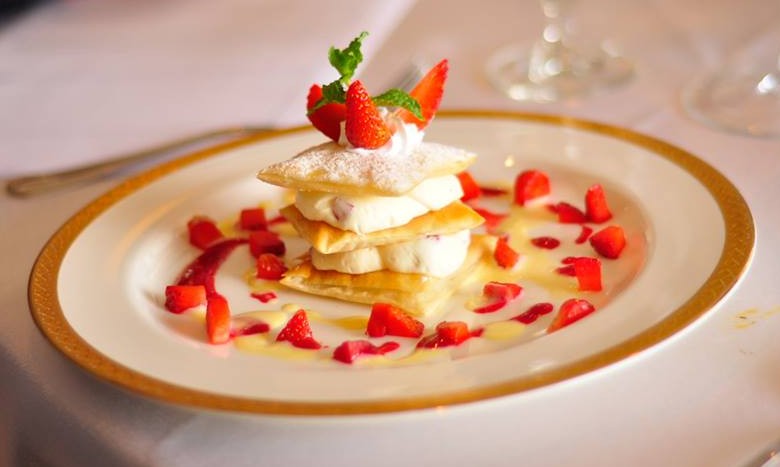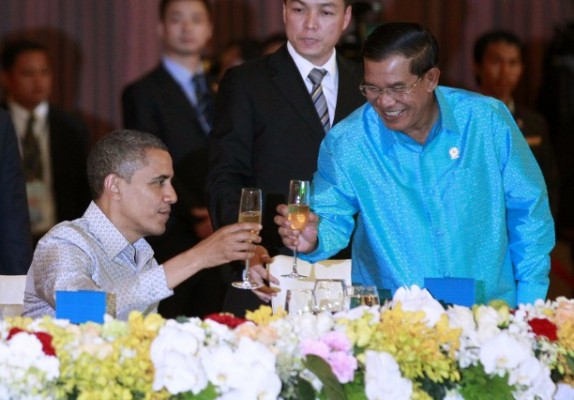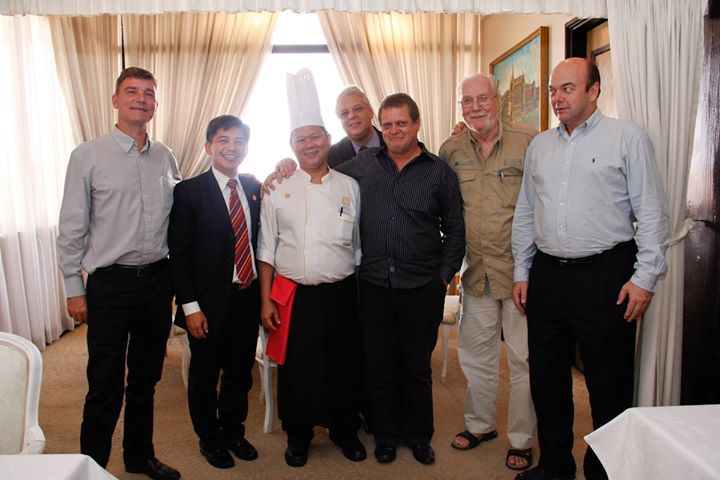
Song Teng estimates that he cooked under eighteen French chefs during his formative years at the Cambodiana Hotel. Some stayed the full one year term, many left a lot sooner, Cambodia in the 1990’s was not the easiest place for a foreigner to settle.
He remembers that cooking with western ingredients was extremely difficult when he started, because there were no ingredients available in the country -the hotel had to fly everything in from Singapore. Teng remains grateful to these chefs, many took him under their wing, they must have spotted his talent, they nurtured his passion. He has great admiration for legendary Chef Didier Corlou, who invested a great deal of time and energy into sharing his considerable knowledge and techniques with the young Cambodian chef.
Early in his career ,Teng was sent to work in the butchery where he would meet another aspiring young Cambodian chef, Luu Meng; he was then moved into the main kitchen where his dedication and passion began to be recognized. However, the young chef was also growing increasingly frustrated as new young understudies would arrive from France, Teng would be charged with teaching them how to cook, only for the young imports to then be promoted ahead of him in the foreign run kitchen. “They were giving me very young kids who knew virtually nothing and once I had trained them up, they were promoted to positions I could only dream about”.
Teng was moved to the Chinese kitchen, where he was trained by a skilled chef who had learned form a Hong Kong master, then he found himself the head Chinese chef when his boss up and left, the hotel’s reputation for Chinese cuisine and the positive feedback began to grow.
As Cambodia began to emerge from the ravages of conflict and rebuild itself, many new hotels and restaurants began popping up in the capital. The Cambodiana Hotel was seen as the only, if not the perfect training ground for good local staff and Teng was faced with a regular flood of departures, lured by offers of higher wages and promising positions in Phnom Penh’s newest establishments. “At the time, the hotel was just about the only place potential employers could go in order to try and poach experienced staff, It was very hard” recalls Teng, “We were always short and always starting from scratch with new staff but, I was learning a lot and was doing a lot of new things, so I was happy”.
Teng was then moved back into the main kitchen as Chef de Partie, by now his talents were becoming increasingly difficult to ignore and he was quickly promoted to Sous Chef de Cuisine, the second in command of the kitchen working directly under the Executive Chef. One day, when the hotel had no foreign executive chef on hand, Teng was asked to cater a banquet for 700 guests, consisting mainly of Cambodian dignitaries and high society. The flood of platitudes and rave reviews the hotel received from these guests, (including some very influential ones) meant that Teng’s dream, a dream that had once seemed too incredible to wish for, was now within his grasp.
Luu Meng worked in the butchery with Song Teng when they first met all those years ago, they worked together for four years and formed an friendship and collaboration that endures to this day. Luu Meng and Song Teng sit together at the vanguard of Cambodia’s finest chef’s, Meng has previously been written about on this site: http://urban-flavours.com/2013/09/master-meng/. Together they had formed a formidable partnership at the Cambodiana Hotel, still young their reputations were growing. When Song Teng took three months leave to get married he returned to be offered the position of his dreams and was delighted to learn that he would share the honour with his friend. Song Teng and Luu Meng were asked to become joint Executive Chefs at the Cambodiana Hotel, this was an extraordinary honour for the young chefs and is the position Teng still holds to this day. Old hands recall that during this time the Cambodiana Hotel was the ‘the only good place in town’ if you wanted to experience fine dinning.
Phnom Penh continued its rebirth and Luu Meng left after several years to become the Executive chef at the newly built Sunway Hotel. Song Teng continued to develop his renown and the sophistication in his kitchen. When the call came for him to cook for his King; he felt it a great privilege and a great honour, he was terrified but, he was determined to make his King proud.
Teng was asked to travel to Siem Reap to cook for his King, on arrival at the site he was shown to a ‘cooking’ room only to discover that it was completely bare, there was no kitchen! As has become his trademark, Teng remained un-flustered, he set people running off all over the town, got what he needed and found a way. He cherishes greatly the letters of appreciation he has received from his King.
Today, Teng is renowned for his ability to pull off large banquets at short notice and he still receives off-site orders from dignitaries and diplomats, some wanting them within the hour. When the ASEAN Summit was held in Cambodia in 2012, with his country chairing for the first time, Teng was asked to cater for the gala dinner to be held in the presence of the President of the United States of America, Barak Obama. Teng felt the reputation of his entire nation was at stake, it had to be perfect. Teng smiles at me, “ We pulled it off” he says; the pride on his face and the twinkle in his eye speaking volumes more than his humble words.

Teng does large banquets regularly, magnificently, he believes the largest one was for 1,500 people. Most of us mere mortals could not fathom trying to prepare a stylish fine dinner for that many people; having to set up in an unfamiliar kitchen, all that cutlery, the glassware and tableware, having all the dishes ready at once and serving all the tables at roughly the same time, no margin for error, 1,500 plates over four or five courses; yet chef maintains that as long as the mise-en-place is well set up, in plenty of time and as long as the staff are well trained and well briefed, then managing them is pretty much the same, large or small. When the food and beverage department goes into meltdown, it is Teng they turn to, to calm them down and find a solution.
I was once summoned to L’Amboise, Teng’s French restaurant at Hotel Cambodiana, he had given me the task of matching wines to some of his signature dishes; now these are no ordinary signature dishes, these are dishes that are the favourites of king’s, queen’s, presidents and prime ministers; dishes perfected over years and the culmination of his formidable experience, spanning his entire career. The restaurant was closed and the meal private, only a handful of the chosen in attendance, selected for their input into this marriage of food and wine. Peter Brogers, president of the local balliage of the Chaine des Rotisseurs, Clive Graham Ranger, international journalist, publisher and author of the book, Cambodia’s Top Tables, Jeroen Van Daalen, country manager of Cellier’s d’Asie and resident hotel manager Pascal Brandt all joined me in partaking of the cuisine and comparing notes on the selected wines and their ability to enhance the dishes and the dining experience.
“This dish is a favourite of the Queen Mother”, is how the first dish was announced and so the meal proceeded along this rich vein of patronage; it was one of the greatest privileges in my own humble career and one of the most magnificent meals I will ever enjoy. If I were part of the hotel management I would seriously be looking at recreating this event as a regular dinner for all patrons to experience and appreciate.

Teng now enjoys training up the next generation of Cambodian chefs and is invigorated by the talent and dedication coming through, but he warns aspiring chef’s that it will be seven to ten years before they are ready. Teng was very proud of one of his own kitchen’s young charges; who has just won the annual competition held by the Cambodia Restaurateurs Association. “We need to work together and we need support”, he enthuses.
Teng believes Cambodia’s chefs should and must work together to promote the unique and high quality ingredients available in regional Cambodia and Khmer cuisine in general. He knows that during the reign of King Sihanouk people would come from all over the world to experience Khmer cooking and now he sees that as being possible again.
He notes that as an oral history much of Cambodia’s culinary culture was destroyed during Khmer Rouge time, because nothing was written down prior to this tragedy. He mentions that Khmer chicken soup is now considered a staple of Cambodian cuisine but, when he started cooking it in his kitchen many years ago -from his grandmother’s recipe- you could not find chicken soup anywhere in the country. He feels it might be time for him and others to start collaborating and recording their recipes, their techniques and the reborn and rebuilt culinary culture of his nation.
One of the things Teng enjoys most when he manages to get out of the kitchen is to visit the countryside and in particular the farms of his suppliers, perhaps he enjoys returning to his roots, when he was the shy, young son of a humble pig farmer.
